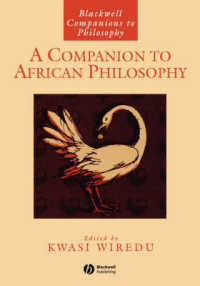- ホーム
- > 洋書
- > 英文書
- > Literary Criticism
Full Description
Crucial to an understanding of Montesquieu's work is the contrast he drew between ancient and modern mentalités. 'Les politiques grecs,' he wrote in his classic work De l'esprit des lois (1748), 'qui vivaient dans le gouvernement populaire, ne reconnaissaient d'autre force qui pût les soutenir que celle de la vertu. Ceux d'aujourd'hui ne nous parlent que de manufactures, de commerce, de finances, de richesses et de luxe meme.'
Ancient philosophers had conceptualised model regimes where human beings would flourish in accordance with their natural purposes and potentialities shaped by good laws well obeyed. Such moderns as Montesquieu, on the other hand, ceased to regard the state as a school for morality. No longer concerned with improving man's soul, politics focused instead on the achievement of liberty, security and material prosperity.
Clearly something novel and distinctive, something recognisably 'modern', arose during the period from Machiavelli to Montesquieu. A teleological universe suffused with transcendent meaning and purposeful ends was supplanted by a more secular, 'disenchanted' world-view. Both the Christian conception of a life lived in humble devotion to the moral commandments of revealed religion and the classical conception of a virtuous life devoted to ethical perfection were challenged by a new political realism stressing the dominance of the passions over reason and the constructive potential of self-interest.
The authors of the eleven essays comprising this volume explore the complex relations between Montesquieu and modernity and between Montesquieu and antiquity. Assessing the content of his three major works, they conclude that whereas the label 'modern' suits Montesquieu, he nonetheless retained certain philosophical approaches characteristic of antiquity as well as a high regard for the primacy accorded to politics and philosophy in the classical era.
Contents
Acknowledgements
David W. Carrithers, Introduction: Montesquieu and the spirit of modernity
I. Overture
Stephen Werner, Comedy and modernity: the Lettres persanes
II. Ancients and moderns
Catherine Volpilhac-Auger, Montesquieu et l'impérialisme grec: Alexandre ou l'art de la conquête
James W. Muller, The political economy of republicanism
Diana J. Schaub, The regime and Montesquieu's principles of education
Elena Russo, The youth of moral life: the virtue of the ancients from Montesquieu to Nietzsche
III. Monarchy, population, taxation and justice
Céline Spector, Vices privés, vertus publiques: de la Fable des abeilles à De l'esprit des lois
David W. Carrithers, Montesquieu and the spirit of French finance: an analysis of his Mémoire sur les dettes de l'état(1715)
Carol Blum, Montesquieu, the sex ratio and 'natural polygamy'
Louis Desgraves, Montesquieu et la justice de son temps
IV. Horizons of interpretation
Daniel Brewer, Thinking history through Montesquieu
Catherine Larrère, Montesquieu and the modern republic: the republican heritage in nineteenth-century France
Index







